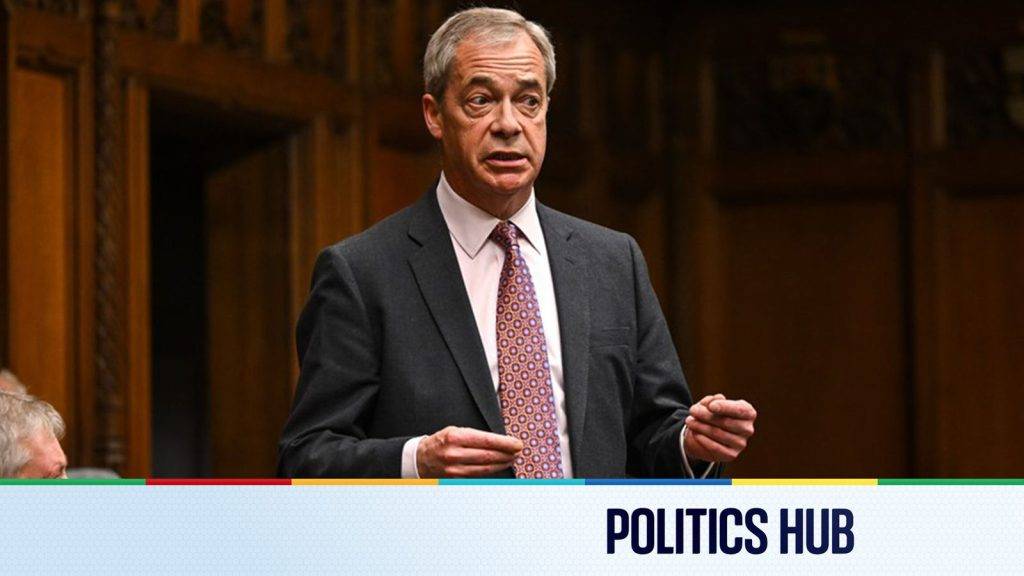Cliff Notes
- The Commons Speaker, Sir Lindsay Hoyle, inaugurated a weekly ceremony to remember MPs who died in both world wars, starting with the “turning of the page” ceremony in the House of Commons Books of Remembrance.
- A minute of silence and prayer were observed as six MPs’ names were read aloud, highlighting the sacrifices made during WWII, including Major Lord Apsley and Colonel James Baldwin Webb.
- Prominent figures commemorated included Major Ronald Cartland and Commander Rupert Arnold Brabner, whose deaths illustrate the diverse roles MPs played during the conflict, from frontline service to parliamentary missions.
Politics latest: Nigel Farage urged to suspend new Reform councillor for sharing Hitler meme about small boats | Politics News
VE Day 80: Commons Speaker leads ceremony remembering MPs killed during World War II
By Ben Bloch, political reporter
After the big events on Monday marking 80 years since Victory in Europe Day, events continue throughout the week ahead of the official anniversary tomorrow.
In parliament this morning, the Speaker of the Commons, Sir Lindsay Hoyle, held the inaugural “turning of the page” ceremony, which is turning the pages of the House of Commons Books of Remembrance which contain the names of members who died in both world wars.
It will now become a weekly ceremony of remembrance while parliament is sitting.
With MPs, peers, staff, and visitors in attendance, a prayer was said and a minute of silence was held at exactly 11am after the Speaker read out the names of six MPs on the first pages of the books who died while serving.
Major Lord Apsley was the MP for Bristol Central, and he was aged 47 when he died in December 1942 while serving with the Arab Legion.
A veteran of World War I, Apsley was an avid pilot, renowned for flying his own planes across Britain and Europe, including one in 1938 to Poland when he left a trail of seven forced landings.
Colonel James Baldwin Webb was the Conservative MP for Wrekin, and he was aged 47 when he died on board the SS City of Benares en route to Canada from the UK on 18 September 1940.
The ship was carrying 90 child evacuees to what was thought would be safety, but the boat was torpedoed and sunk in the Atlantic by a German U-boat, killing all but 13 children.
Captain Robert Bernays and John Dermot Campbell were both serving MPs – Liberal-Nationalist MP for Bristol North and Conservative MP for County Antrim respectively – died together while on a parliamentary mission to visit British forces in Italy in January 1945.
Commander Rupert Arnold Brabner was the Tory MP for Hythe in Kent when an aircraft taking him to Canada and was lost off the Azores in 1945. He was aged just 33, and married only five months.
He served as a fighter pilot during the Second World War, and renowned for his abilities, with multiple confirmed hits on enemy aircraft.
Major Ronald Cartland was the Conservative MP for King’s Norton, Birmingham, and was one of the first parliamentarians to be killed in action during World War II, when he was shot and killed at age 33 near Watou in Belgium in May 1940.
He was the younger brother of prolific romantic novelist Dame Barbara Cartland, whose step-granddaughter was the late Diana, Princess of Wales,
During the war, he was served in the Worcestershire Yeomanry, Royal Artillery, and tasked with defending the hilltop town of Cassel in northern France.
He was shot and killed while with British forces making their way to Dunkirk – but his family did not learn of his fate until nearly a year later, when his mother received a letter from one of Cartland’s men, who was in a German prison of war camp.


